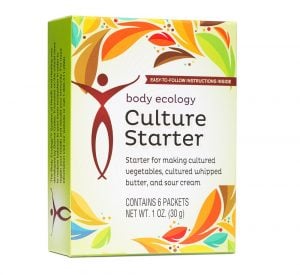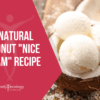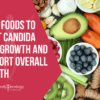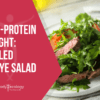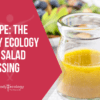The #1 Probiotic for a Really Healthy New Year
We know the body needs probiotics to aid in digestion — but the benefits of L. plantarum, one of our favorite Body Ecology probiotic strains, extend far beyond the digestive tract. As you would expect, L. plantarum starts doing its hard work in the gut, colonizing while balancing out the pathogenic bacteria. From there, it continues to work and produce in a way that benefits the health of the entire body, manufacturing a critical B vitamin that the body can’t make on its own.
We’ll cover more on this B vitamin in a moment. But first, let’s start by understanding L. plantarum’s true purpose and what it can do for your gut.
The Benefits of L. Plantarum: It Starts in the Gut
Your body needs folate to synthesize and repair DNA. Only one Lactobacillus probiotic, the same bacterium found in the Veggie Culture Starter, can make natural folate in the gut.
Research in support of this hard-working probiotic strain abounds. Lactobacillus plantarum has not only been proven as effective as an antiseptic in a hospital setting, but two ground-breaking 2016 studies confirmed that it can decrease anxiety and protect against toxic heavy metal exposure.1,2,3 We also know that probiotics (especially sour foods, like the L. plantarum-rich fermented vegetables made with our Body Ecology Veggie Starter Culture) can help to naturally decrease cravings.4 That’s why we consider L. plantarum an ideal day-to-day probiotic to promote good health all year long, especially when you want to get off of sugar.
Wondering what Body Ecology is all about? You can find out the basics here.
“Plantarum is such a special bacterium. That’s what’s in our Culture Starter. That’s how we make fermented vegetables and have for more than 20 years,” says Donna Gates, fermented foods pioneer and creator of The Body Ecology Diet. “Plantarum degrades oxalates. It also degrades histamines so you don’t have too much histamines. There’s so many things. It’s antiviral; it’s antibacterial. If you take an antibiotic, L. plantarum is not wiped out by most antibiotics on the market, and it’s the first bacteria that you can put in your gut right after you’ve done a detox treatment.”
Now here’s where the benefits of L. plantarum get even more interesting: regarding the probiotic strain’s ability to produce natural folate in the gut. One of the most important nutrients that you will find in food is folate. Folate is a B vitamin (B9) that we cannot manufacture — we must source our folate through the food that we eat or through supplements.
While we cannot make folate, some of the microbes living in the intestinal tract can.
This is good news because folate allows us to synthesize and repair DNA, making it an essential nutrient for expecting mothers and growing children. Folate also helps manage the expression of DNA, which means that it can help keep us healthy even if we are genetically wired to get sick. Because folate supports cell division, it also helps the body make healthy red blood cells. Without enough folate, the body pumps out large, immature blood cells, and we are more likely to develop anemia.5
Folic Acid versus Folate: What’s the Difference?
Most vitamins and fortified foods contain folic acid, the synthetic version of folate. Even though folic acid functions similar to folate in the body, supplementing with synthetic folate is not entirely risk free. For example, some research shows that synthetic folic acid may encourage the growth of cancer cells once they have already developed into a tumor.6 Other researchers are concerned that synthetic folic acid can mask a vitamin B12 deficiency, leaving it undiagnosed and untreated.7
Finally, synthetic folic acid does not easily break down in the body. This means that most of us — if we have eaten fortified foods or have supplemented with folic acid — are carrying around high levels of unused folic acid in our blood. Even newly delivered babies have unused folic acid in their umbilical cord blood.8
Knowledge is power. Here’s a full list of our Body Ecology courses.
This is a concern because unused folic acid may be related to brain deterioration in the elderly.9
The good news is that many foods are rich in natural folate. This includes:
- Liver
- Spinach and other green, leafy vegetables
- Black-eyed peas
- Asparagus
- Brussels sprouts
Body Ecology’s Cultured Vegetables Offer More Folate — and Other Big L. Plantarum Benefits
Lactobacillus plantarum is the only probiotic from the Lactobacillus family that can make natural folate. All other popular Lactobacillus probiotics — like L. acidophilus — cannot make folate.10 Fortunately, L. plantarum is a team player. One study published in 2013 found that a probiotic supplement containing L. plantarum can boost the numbers of beneficial Bifidobacteria in the gut while decreasing the numbers of harmful microorganisms.11
More than a team player, Donna considers L. plantarum the captain of the team, “L. plantarum is one of those super microorganisms in the microbiome in your gut that tells the other bacteria what to do. If you think about it, the bacteria need leaders, and certain bacteria are the leaders.” Like Alexander the Great, L. plantarum is one of those “Alexander Organisms” that makes big, healthy changes in the gut, and all the other bacteria follow.
There’s a buzz about Body Ecology. Hear what members of our tribe have to say.
While L. plantarum does a lot of good for the body, researchers in Brazil found in 2014 that it does not like to hang around in the digestive tract. This is true even when L. plantarum is consumed for long periods of time.12
In other words, L. plantarum is more like a visitor to your inner ecosystem than a resident.
Body Ecology’s Culture Starter targets our special need for folate. Along with a few other friendly microbes, it contains L. plantarum. Every time we eat a few ounces of cultured vegetables, we inoculate our inner ecosystems with L. plantarum — which will go on to produce folate in the gut while also supporting a healthy inner ecosystem. We also consume more folate than we would have by eating leafy greens raw and unfermented. If you are looking for an extra boost of natural folate, culture your leafy greens with Body Ecology’s Culture Starter. Body Ecology’s Culture Starter is more powerful than ever. According to our lab results, using our Starter Culture increases CFUs to as much as 1,800,000 per gram, compared to 58,000 CFU per gram without using a starter culture!†
We can’t emphasize enough the importance of L. plantarum’s ability to produce this natural folate the body needs to synthesize and repair DNA. But in 2016, even more interesting research came to light, confirming L. plantarum’s role as a supporter of our most vital body processes. French researchers found that L. plantarum gut microbes transferred from healthy children to mice could negate some of the most devastating effects of malnutrition.13 Yes, L. plantarum helps the body to build and repair, and it also helps us grow when we are at our most vulnerable. Proven to be one of the most protective probiotic strains out there, L. plantarum is the one you want in your gut.
What To Remember Most About This Article:
Folate is an important B vitamin that the body can’t manufacture on its own. Most of the time, your body absorbs folate from food sources or supplements. Folate is critical because it allows the body to synthesize and repair DNA. This nutrient is especially significant for pregnant women and growing children.
There are quite a few delicious foods that are naturally rich in folate, including liver, spinach, asparagus, and Brussels sprouts. But there is only one probiotic in the Lactobacillus family that can make natural folate, L. plantarum.
Body Ecology’s Culture Starter is rich in L. plantarum to meet your folate needs. Eating a few ounces of cultured vegetables a day can inoculate your inner ecosystem with L. plantarum to help produce folate in the gut. L. plantarum performs this important role, but it isn’t just a one-trick pony. When you’re eating fermented vegetables made from our Veggie Culture Starter, and inoculating your gut with L. plantarum, this bacterium may also work as an antiseptic, reduce anxiety, and protect against heavy metal exposure. We always recommend L. plantarum as a powerhouse probiotic to support good and even great gut health all year long.
REFERENCES:
- Klarin B, Molin G, Jeppsson B, Larsson A. Use of the probiotic Lactobacillus plantarum 299 to reduce pathogenic bacteria in the oropharynx of intubated patients: a randomised controlled open pilot study. Critical Care. 2008;12(6):R136. doi:10.1186/cc7109.
- Davis DJ, Doerr HM, Grzelak AK, Busi SB, Jasarevic E, Ericsson AC, Bryda EC. Lactobacillus plantarum attenuates anxiety-related behavior and protects against stress-induced dysbiosis in adult zebrafish. Sci Rep. 2016 Sep 19;6:33726. doi: 10.1038/srep33726. PubMed PMID: 27641717; PubMed Central PMCID: PMC5027381.
- Qixiao Zhai, Fengwei Tian, Jianxin Zhao, Hao Zhang, Arjan Narbad and Wei Chen. Oral administration of probiotics inhibits heavy metal cadmium absorption by protecting intestinal barrier. Applied and Environmental Microbiology, 2016 DOI: 10.1128/AEM.00695-16.
- Jonathan Breton, Naouel Tennoune, Nicolas Lucas, Marie Francois, Romain Legrand, Justine Jacquemot, Alexis Goichon, Charlène Guérin, Johann Peltier, Martine Pestel-Caron, Philippe Chan, David Vaudry, Jean-Claude do Rego, Fabienne Liénard, Luc Pénicaud, Xavier Fioramonti, Ivor S. Ebenezer, Tomas Hökfelt, Pierre Déchelotte, Sergueï O. Fetissov. Gut Commensal E. coli Proteins Activate Host Satiety Pathways following Nutrient-Induced Bacterial Growth. Cell Metabolism, 2015; DOI: 10.1016/j.cmet.2015.10.017.
- Stover, P. J. (2004). Physiology of folate and vitamin B12 in health and disease. Nutrition reviews, 62(s1), S3-S12.
- Ryan, B. M., & Weir, D. G. (2001). Relevance of folate metabolism in the pathogenesis of colorectal cancer. Journal of Laboratory and Clinical Medicine, 138(3), 164-176.
- Carmel, R., & Jacobsen, D. W. (Eds.). (2001). Homocysteine in health and disease. Cambridge University Press.
- Obeid, R., Kasoha, M., Kirsch, S. H., Munz, W., & Herrmann, W. (2010). Concentrations of unmetabolized folic acid and primary folate forms in pregnant women at delivery and in umbilical cord blood. The American journal of clinical nutrition, 92(6), 1416-1422.
- Morris, M. S., Jacques, P. F., Rosenberg, I. H., & Selhub, J. (2010). Circulating unmetabolized folic acid and 5-methyltetrahydrofolate in relation to anemia, macrocytosis, and cognitive test performance in American seniors. The American journal of clinical nutrition, 91(6), 1733-1744.
- Sybesma, W., Starrenburg, M., Tijsseling, L., Hoefnagel, M. H., & Hugenholtz, J. (2003). Effects of cultivation conditions on folate production by lactic acid bacteria. Applied and environmental microbiology, 69(8), 4542-4548.
- Wang, L., Zhang, J., Guo, Z., Kwok, L., Ma, C., Zhang, W., … & Zhang, H. (2013). The Impact of Oral Consumption of the Probiotic Lactobacillus plantarum P-8 on the Faecal Microbiota, SIgA, SCFAs and TBAs of Subjects of Different Age. Nutrition.
- Costa, G. N., Marcelino-Guimarães, F. C., Vilas-Bôas, G. T., Matsuo, T., & Miglioranza, L. H. S. (2014). Potential fate of ingested Lactobacillus plantarum and its occurrence in human feces. Applied and environmental microbiology, 80(3), 1013-1019.
- L. V. Blanton, M. R. Charbonneau, T. Salih, M. J. Barratt, S. Venkatesh, O. Ilkaveya, S. Subramanian, M. J. Manary, I. Trehan, J. M. Jorgensen, Y.-m. Fan, B. Henrissat, S. A. Leyn, D. A. Rodionov, A. L. Osterman, K. M. Maleta, C. B. Newgard, P. Ashorn, K. G. Dewey, J. I. Gordon. Gut bacteria that prevent growth impairments transmitted by microbiota from malnourished children. Science, 2016; 351 (6275): aad3311 DOI: 10.1126/science.aad3311.
†Note that these figures may vary slightly from batch to batch.

